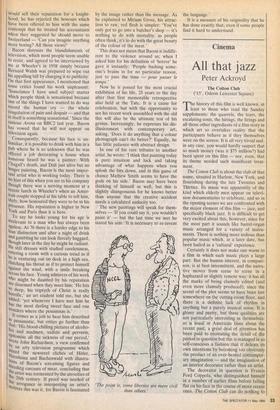Cinema
All that j azz
Peter Ackroyd
The Cotton Club ('15', Odeon Leicester Square)
The history of this film is well known, at least to those who read the Sunday supplements: the quarrels, the tears, the escalating costs, the hirings, the firings and all those other ingredients of a film story in which art so overtakes reality that the participants behave as if they themselves were on the screen. It is all very trivial and, in any case, you would hardly suspect that so much money (was it $75 million?) had been spent on this film — nor, even, that its theme needed such munificent treat- ment.
The Cotton Club is about the club of that name, situated in Harlem, New York, and flourishing during the late Twenties and Thirties. Its music was apparently of the kind which elderly men appear on televi- sion documentaries to celebrate, and so in the opening scenes we are confronted with the major element of this film — jazz, and specifically black jazz. It is difficult to get very excited about this, however, since for the most part it sounds like barrel-organ music arranged for a variety of instru- ments. There is nothing more tedious than popular music which, at a later date, has been hailed as a 'cultural' experience.
Certainly it does not make one warm to a film in which such music plays a large part. But the human interest, in compari- son, is at best intermittent, and the narra- tive moves from scene to scene in a haphazard or slightly remote way: it has all the marks of being clumsily edited (and even more clumsily produced), since the secret of the plot seems to have been lost somewhere on the cutting-room floor, and there is a definite lack of rhythm in anything but a purely musical sense. It is glossy and pretty, but these qualities are not particularly interesting in themselves: as is usual in American films about the recent past, a great deal of attention has been paid to recreating the detail of the period in question but this is managed in so self-conscious a fashion that it defeats its own intentions by becoming too obviously the product of an over-heated contempor- ary imagination — and the imagination of an interior decorator rather than an artist.
The decorator in question is Francis Ford Coppola, who distinguished himself in a number of earlier films before falling flat on his face in the course of more recent ones. The Cotton Club can do nothing to improve his reputation since, except for a certain surface kitsch and a tendency to spread an amber glow over the screen, his own contribution is difficult to detect. One thing is clear, however: by turning the film into a number of over-orchestrated tab- leaux, he has merely ensured that the narrative is drained of any internal interest and that it glides smoothly but unconvin- cingly to its conclusion.
It is, apart from anything else, a waste of the actors involved — among them that new 'star', Richard Gere, who looks pretty from time to time, but is generally to be found in postures of inane animation, clicking his fingers and smiling a great deal in what is apparently the usual manner of jazz musicians. The plot, as much as it is about anything, is concerned with ro- mance, showbusiness ('behind the scenes', naturally), tuxedos, thuggery, rooms bathed in cigarette smoke, whispered con- versations and all that jazz. There is the usual mixture of gangsters (for some reason Coppola, who once made The Godfather, treats these malign creatures as almost sacred objects), molls, club-owners, artistes etc, all of them joining that flashy parade of the Thirties as it is generally represented in the cinema. The script stays on much the same level, combining (when it can be heard above the music) juvenility and banality: 'You move me,' Richard Gere announces to a lady, 'in unusual places.' Perhaps he meant his socks.
There are very few compensations and, although the song and dance routines within the Cotton Club have been highly praised as replicas of that happy era, they fall somewhere short of being breathtak- ing. Certainly the performances on the club stage are more entertaining than those being conducted off it, but they still seem a little bogus: I suspect that they suffer from that 'show-biz' reverence for anything which was popular years before, as evinced in the prizes given to ancient actors during the Academy Awards ceremonies. And so, all in all, and without putting too fine a point on it, The Cotton Club is tremendously dreary. Those who like fun, music and entertainment may discover that Radio One has more to offer.















































 Previous page
Previous page